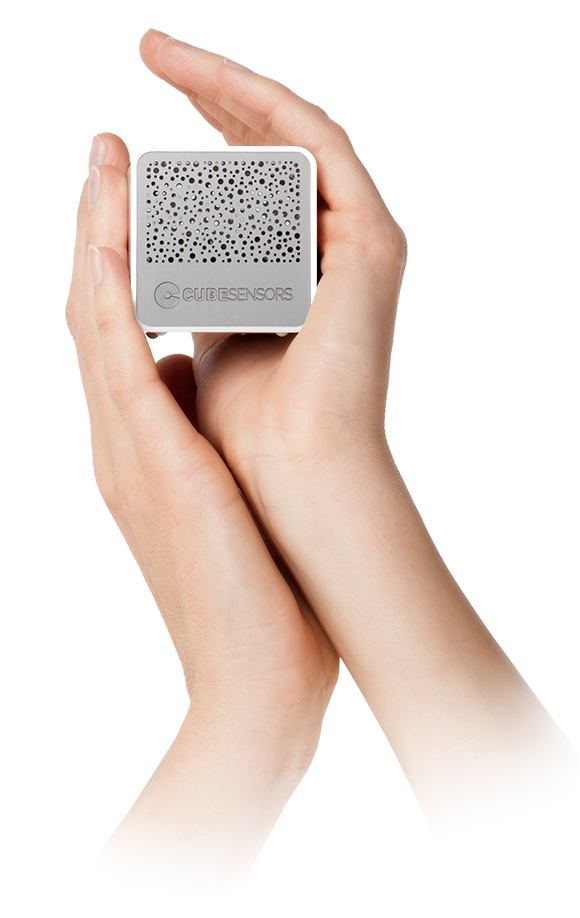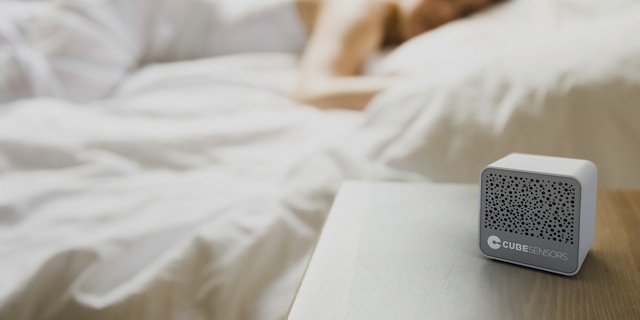5 ways for making your bedroom environment sleep friendly
by Alja Isakovic
Did you sleep well tonight? I bet a lot of you can’t give me a positive answer to this simple question. Either you had trouble falling asleep, or you woke up in the middle of the night for no apparent reason, or maybe that stupid alarm clock woke you in the middle of the most interesting dream you were having.
Like it or not, sleep is an essential part of our lives. It’s like a magic self-healing potion that revitalizes our bodies and minds. At least that’s the theory. 62% of American adults experience a sleep problem a few nights per week. The increasing popularity of sleep tracking smartphone apps and wearable gadgets also proves sleep is still a big mystery for a lot of us. And while sleep tracking can tell you how much sleep you’re getting, it can’t give you the full picture of what’s going in your bedroom without additional sensors.
That is why a lot of you seem to be keen on placing one of your CubeSensors in your bedroom, where we spend about a third of our days. By combining data with your favorite sleepy tracker, it’s easy to see if there’s something wrong in your bedroom. Before we try some real-life experiments with that, let’s take a look at the basic characteristics of your indoor environment that are needed for a good night’s sleep!
1) Temperature: steady and lower than in other rooms
Do you sometimes wake up covered in sweat? Your bedroom is too hot. While we do have our own individual preferences, you’ll usually sleep better if you keep your bedroom at a slightly lower temperature than your living spaces. Avoid going above 75°F (24°C) or below 54°F (12°). Some even say the sweet spot lies between 60° and 68°F (16 and 20°C). Having a consistent and not too hot bedroom (around 68°F or 20°C) is especially important for small children. Thermostats, connected to your heating and air conditioning system, can help you keep the temperature constant.
2) Humidity: find the golden mean
Balancing humidity can be a tricky act, but it’s even more important for health in our bedrooms. Dry winter air can cause dry skin, irritated throats, and makes cold, flu and other viruses feel right at home. In summer, high humidity will encourage mold growth and make various bugs happy. That’s why your bedroom humidity levels should be around 50% all year around. You can increase humidity with a humidifier, decrease it with a dehumidifier or with the help of your air conditioner’s dry mode. Just make sure not stray too far above or below the golden mean.
3) Air quality: keep your VOC levels in check
Your shiny new mattress might be super comfortable to sleep on, but it might also be emitting harmful VOCs (Volatile Organic Compounds) into the air you breathe in while you’re in the most delicate state. In fact, researches have discovered a link between indoor air pollution and sleep-disordered breathing.
The new mattress smell? You don’t want to be surrounded by that giant bucket of VOCs in you sleep. Let the mattress do its initial off-gassing in a well-ventilated room for a few days. Old mattresses and old carpets are also among other common VOC-emitting offenders. Don’t be tempted to use air-fresheners to mask all the bad smells though; it’s a much better idea to let some fresh air from the outside flow through the bedroom before sleep. Keeping windows open during summer can also be beneficial, but not if you live in a high humidity area or if the temperature drops too low during the night.
4) Noise: consistent noise might be helpful
It’s pretty obvious that a noisy snoring partner, a bored cat or partying neighbors can wake you up. A bit less obvious are noises we don’t consciously notice, but that are loud enough to prevent us from reaching a deep sleep state. In nature, noise means possible danger, so we’re used to paying attention.
If you live in a noisy neighborhood and can’t do much about recurring noises, it can help to have consistent background noise playing. In this way, you train yourself to just ignore the noise alltogether. There are a lot of smartphone apps that provide background noises of different kinds, from city traffic sounds to relaxing rainfall. If you get used to sleeping with a consistent noise, it can even help you get a good night’s sleep while traveling and sleeping in hotels with a different noise footprint. Alternatively, you can try blocking out all sounds by wearing earplugs, which, unfortunately, isn’t always a comfortable choice.
5) Light: darkness means sleep
Once upon a time, we lived a simpler life without artificial light. Our bodies used darkness as the universal sign for sleep. These days, we’re making it really tricky for our bodies to get the right signal. We stay up late watching bright TV or computer screens. It’s no wonder that our bodies are left confused when we suddenly turn off the light and expect to fall asleep immediately.
In fact, it takes a bit more darkness for our bodies to release enough melatonin, the sleep hormone, which relaxes you and takes you away into the sweet land of sleep. That is why it’s best to keep your bedroom free of any shiny gadgets. Even an alarm clock with a bright LED display can confuse the body and make you paranoid about your wake up time. What’s more, a full moon or street lighting can be bright enough to rouse you from sleep. Use blinds on your windows or a sleeping mask to make sure it’s dark enough and your body gets the right message!
Your bedroom environment is part of the sleep equation
There are of course other factors that can make you sleep better or worse, from what/when/how much you eat to your daily stress levels. The best way to find what’s preventing you from getting a good night’s sleep is to keep a sleep diary that logs the time of sleep and other relevant information. Just don’t forget to add important environmental data to the equation!

